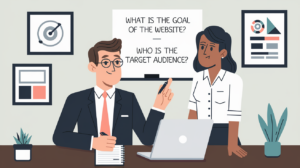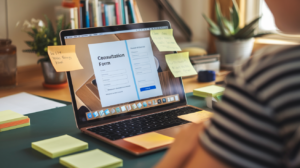A website is the foundation of your online presence. Whether you’re building one from scratch or updating an existing site, a consultation helps you set expectations and get the best results. But not all web design companies work the same way.
Asking the right questions helps you choose a team that understands your needs and delivers a site that works for your business. At Texas Web Design, we specialize in creating SEO-friendly, user-focused websites that help businesses grow.
If you’re planning a new website or a redesign, asking the right questions during a consultation can save time and help you get a site that meets your goals. Using effective conversation starters can also facilitate meaningful discussions and deeper understanding during the consultation.
Here’s what to ask to make the most of your website consultation.
1. Do You Have Experience With My Industry?
Different businesses have different website needs. A law firm’s website focuses on credibility and client inquiries, while an online store needs smooth checkout features.

Follow-up questions:
- Can you show examples of websites you’ve built in my industry?
- What are some challenges you’ve solved for similar businesses?
2. Will My Website Be Custom-Built or Template-Based?
Some agencies build fully custom websites, while others use pre-made templates. Many web designers faced limitations in the early days of web design, where they often resorted to complicated table structures or spacer images to achieve desired layouts.
Custom sites offer more flexibility, while templates are often more affordable. Knowing what you’re getting helps you plan.
Follow-up questions:
- If using a template, how much can be customized?
- What influences the choice between a custom design and a template?
3. How Will My Website Support My Business Goals?
Your website should do more than look good—it should serve a purpose. Whether your goal is to generate leads, sell products, or build credibility, the site’s design and features should work toward that outcome by effectively increasing website traffic.
Follow-up questions:
- How will the website help with customer engagement?
- What strategies will make visitors take action?
4. What Content Management System (CMS) Will You Use?
A CMS lets you update your web content and website without needing a developer. Some of the most common ones are WordPress, Shopify, and Webflow. Some companies use their own custom platforms, which might limit your ability to make changes.
Follow-up questions:
- Will I be able to update text, images, and blog posts easily?
- Do you offer training on how to use the CMS?
5. Will My Website Be Optimized for Search Engines (SEO) to Increase Website Traffic?
A website should not only look great but also rank well on search engines. SEO-friendly design includes fast loading times, mobile responsiveness, proper keyword usage, and web accessibility to improve usability for individuals with disabilities.
Follow-up questions:
- Do you research keywords and optimize content?
- How will you make the website load faster?
6. Will My Website Work Well on Mobile Devices and Support Web Accessibility?
Most people browse websites from their phones. A mobile-friendly site, built with responsive design, adjusts to different screen sizes, loads quickly, and is easy to use.
Follow-up questions:
- Will the site be designed with mobile users in mind?
- How do you test the site on different devices?
7. How Will My Website Be Protected From Security Threats?
Online security matters, especially if your site collects customer data. Protecting against hackers, malware, and data breaches requires a team effort and should be a priority.
Follow-up questions:
- Will my site have SSL encryption?
- How will you protect against hacking and other threats?
8. How Will You Improve Website Speed and Performance?

Follow-up questions:
- What steps do you take to improve speed?
- Will the site be tested for performance before launch?
9. What Is the Estimated Timeline for Completion?
Website projects take time, and delays can happen. A clear timeline helps you plan and keeps things on track. Timely delivery of each web page is important for keeping the overall project on schedule.
Follow-up questions:
- What are the key stages of the project?
- What could cause delays?
10. How Will We Communicate During the Project?
Good communication is important for designing an effective user interface and makes the process smoother. Set expectations early on how often you’ll get updates and who to contact with questions.
Follow-up questions:
- What tools do you use for communication (email, calls, project management software)?
- How often will I receive progress updates?
11. What Does the Pricing Include?
Website costs vary depending on the features, design, and services included, and web designers play an important role in determining these costs. Getting a clear breakdown prevents unexpected charges.
Follow-up questions:
- Does the price cover design, development, hosting, and SEO?
- Are there extra costs for revisions or additional features?
12. Will I Have Full Ownership of the Website?
Some agencies retain ownership of websites or charge ongoing fees for access. Make sure you have full control over your site after launch, including the ability to manage it with your web developers.
Follow-up questions:
- Will I receive all the website files and logins?
- Who owns the domain and hosting account?
13. What Happens If I Need Changes in the Future?
Your website should be flexible enough to grow with your business, and user interface design plays an important role in this. Find out how easy it is to update and whether you’ll need developer support.
Follow-up questions:
- Can I make content updates myself?
- What are my options for ongoing support?
14. Do You Offer Website Support and Maintenance?
Design websites need regular updates, backups, and security checks. Some agencies offer maintenance plans, while others charge per request.
Follow-up questions:
- What kind of support do you offer after launch?
- Do you provide maintenance plans?
15. How Do You Track Website Success?

Follow-up questions:
- What metrics will you monitor (traffic, conversions, engagement)?
- Will I receive reports on website performance?
Get a Website That Works for Your Business
A website consultation is your chance to ask questions, understand the process, and make the most of your investment. The more you know, the better choices you can make.
At Texas Web Design, we create SEO-friendly, user-focused websites designed to help businesses grow in the ever-evolving world wide web. Whether you need a new site or an upgrade, we’re here to help.

